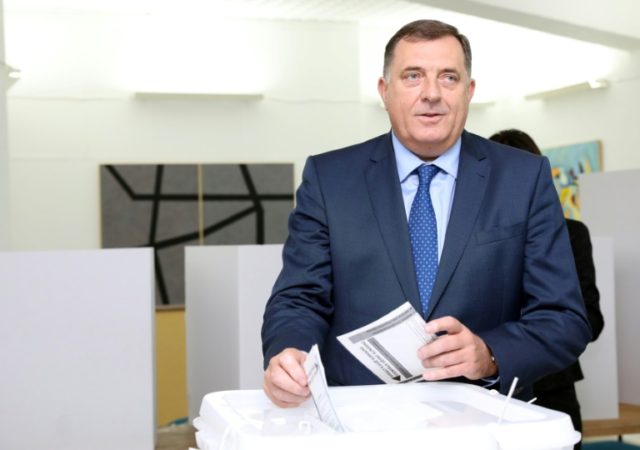Sarajevo (AFP) – Nationalist Milorad Dodik claimed victory Sunday in the vote for the Serb seat of Bosnia’s tripartite presidency, a post he will share with Muslim and Croat leaders in a country splintered along ethnic lines.
The elevation of the hardliner to the top office lays bare the nationalism haunting Bosnia more than two decades after it was torn apart by war.
Dodik is the longtime leader of Bosnia’s Serb-majority Republika Srpska, one of the country’s post-war entities.
He has previously threatened to hold a vote on the region’s secession — a move that would unravel a delicate arrangement that has kept peace since the 1992-95 conflict.
Now the firebrand will co-lead a country he has referred to as a “failed concept”.
“This victory is as clean as a whistle,” Dodik announced from his base in Banja Luka, the capital of the Serb-run entity.
He said he captured 56 percent of the vote, beating his moderate rival Mladen Ivanic with 85 percent of the ballots counted.
The electoral commission confirmed Dodik’s lead, announcing after midnight that he had 55.15 percent of the vote after input from 43 percent of polling stations.
But the incumbent Ivanic claimed the race could not yet be called.
“We will wait for the report of our observers to see if everything has gone well,” he said in a televised statement.
Meanwhile, the main Bosnian Muslim party SDA, claimed a victory for its candidate Sefik Dzaferovic in the three-person presidency.
And the Croat post went to Social Democrat Zeljko Komsic, knocking out current president Dragan Covic from the nationalist right.
Bosnia’s complex — and some say disfunctional — political system is a relic of the 1990s war that saw Serbs, Croats and Muslims turn on each other in brutal fashion.
The conflict left 100,000 dead, displaced millions and wrecked the economy and infrastructure.
The peace accord that stopped the fighting sliced the country in two halves — one dominated by Serbs and the other home to Muslims and a Croat minority.
Each “entity” has its own government with a high level of autonomy.
They are held together by a relatively weak national administration, headed by the tripartite presidency which rotates between memebers every eight months.
– Divide and rule –
As always ahead of elections, many politicians leaned into nationalist rhetoric to court voters.
During the campaign Dodik repeated claims that Bosnia was “not a state” and that its capital Sarajevo was “foreign territory.”
After casting a ballot in his hometown Laktasi, the Serb strongman said he would work with Bosnia’s institutions but “solely in the interest and benefit of Republika Srpska.”
Dodik, who is vocally pro-Russian, was blacklisted by the United States last year for threatening Bosnia’s integrity.
How he will approach his new role remains to be seen.
The most extreme scenario would see him “work towards the decomposition of Bosnia,” says Tanja Topic, a political analyst.
After voting, one of Dodik’s supporters in Laktasi, Jadranaka Pavic, said she expected him to “go to Saraejevo to fight (the others) there.”
– Disillusionment –
Among the population of 3.5 million, there is a pervasive sense of disillusionment with a political class accused of clinging to power by stoking nationalism instead of fixing economic woes.
Monthly wages average around 430 euros while around one fifth of the population is unemployed.
“No party meets my expectations as a citizen,” said Danica Odovic, a 47-year-old bookseller outside a polling station in Banja Luka.
She added that she was voting only for “change… not because I think the others are better.”
Experts say Bosnia’s unwieldy political structure hampers progress on reforms and creates a space for graft to run wild.
According to Transparency International, corruption is a serious problem at “all levels of government”.
“Most young people see their future outside Bosnia,” said Zoran Kresic, an analyst.
Hearing these “same stories, messages of war and of the impossibility of living together, demotivates people from staying”, he added.
Voter turnout was estimated to be close to the 55 percent figure from 2014, according to the electoral commission, with no significant incidents reported.

COMMENTS
Please let us know if you're having issues with commenting.